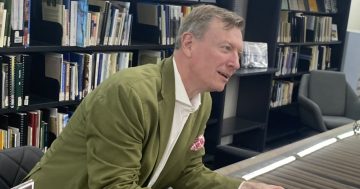Michelle Gibbings* says from Stockholm Syndrome to belief in a flat earth, there are many things once taken as gospel that don’t stand up to serious challenge.
 Recently, I read Jess Hill’s confronting and compelling book, See What You Made Me Do: Power, Control and Domestic Abuse.
Recently, I read Jess Hill’s confronting and compelling book, See What You Made Me Do: Power, Control and Domestic Abuse.
She recounts analysis that dismantles the concept of the Stockholm Syndrome.
I’m sure you’ve heard of it; perhaps like me, even used the term.
If you haven’t, it was invented in 1973 by a psychiatrist following a hostage situation at a Stockholm bank.
The problem is that the hostage who was central to the drama and the subsequent so-called syndrome was never interviewed by the psychiatrist.
Nor was the syndrome ever empirically tested.
It got me thinking about other things we are told (even educated about), which we accept and take as fact.
As a child learning about history, I was told that hundreds of years ago people thought the earth was flat, and it was only the adventures of Christopher Columbus in 1492 that shattered this myth.
It turns out the whole flat earth story is more myth than fact too.
What we know and don’t know keeps changing and evolving.
It is easy to become fixated on one way of seeing things and to hold on too tight to ideas and concepts that are no longer valid.
Adam Grant, in his new book, Think Again: The Power of Knowing What You Don’t Know, shares the perspective that too often we think and share views in certain modes.
These modes fit the cast-types of certain professions as follows.
Preachers
We are convinced that we have found the truth, and so we don’t question any assumptions or challenge prevailing views.
We don’t listen, question or wonder about what could be.
Prosecutors
We are trying to win the case, and so our starting position is that the other side is wrong.
We don’t listen; we debate and find ways to poke holes in their position.
Politicians
We are trying to cater to the needs of the target audience.
Adopting this stance, it’s about getting the audience’s approval, support, vote etc.
So we aren’t rethinking underlying beliefs and we can sacrifice our own beliefs to satisfy the needs of others.
These three modes of thinking aren’t mutually exclusive.
In fact, we move between modes in different circumstances, with varying people and even within conversations.
Grant encourages us to think like a scientist. When scientists are working through an issue, they’ll set a series of hypothesis to explore and test.
They’ll apply different thinking, test concepts and analyse the results.
They aren’t fixated on one right outcome, and if they discover their hypothesis is wrong they don’t see this as a failure. In fact, it’s another step forward.
It’s making progress, because they know that it’s through the process of thinking, experimenting and analysing, often many times, that eventually new ideas and insights emerge and in time, the problem will be solved.
They know that learning never stops.
As American neuroscientist, David Eagleman once remarked: “What you learn from a life in science is the vastness of our ignorance.”
The question to ponder is what do you assume you know that perhaps it’s time to challenge?
*Michelle Gibbings is a Melbourne-based change leadership and career expert and founder of Change Meridian. She can be contacted at [email protected].
This article first appeared at changemeridian.com.au.











